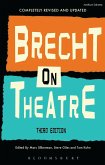Can theatre change the world? If so, how can it productively connect with social reality and foster spectatorial critique and engagement?
This open access book examines the forms and functions of political drama in what has been described as a post-Marxist, post-ideological, even post-political moment. It argues that Bertolt Brecht's concept of dialectical theatre represents a privileged theoretical and dramaturgical method on the contemporary British stage as well as a valuable lens for understanding 21st-century theatre in Britain.
Establishing a creative philosophical dialogue between Brecht, Walter Benjamin, Theodor W. Adorno and Jacques Rancière, the study analyses seminal works by five influential contemporary playwrights, ranging from Mark Ravenhill's 'in-yer-face' plays to Caryl Churchill's 21st century theatrical experiments. Engaging critically with Brecht's theatrical legacy, these plays create a politically progressive form of drama which emphasises notions of negativity, ambivalence and conflict as a prerequisite for spectatorial engagement and emancipation.
This book adopts an interdisciplinary and intercultural theoretical approach, reuniting English and German perspectives and innovatively weaving together a variety of theoretical strands to offer fresh insights on Brecht's legacy, on British theatre history and on the selected plays.
The ebook editions of this book are available open access under a CC BY-NC-ND 4.0 licence on bloomsburycollections.com.
This open access book examines the forms and functions of political drama in what has been described as a post-Marxist, post-ideological, even post-political moment. It argues that Bertolt Brecht's concept of dialectical theatre represents a privileged theoretical and dramaturgical method on the contemporary British stage as well as a valuable lens for understanding 21st-century theatre in Britain.
Establishing a creative philosophical dialogue between Brecht, Walter Benjamin, Theodor W. Adorno and Jacques Rancière, the study analyses seminal works by five influential contemporary playwrights, ranging from Mark Ravenhill's 'in-yer-face' plays to Caryl Churchill's 21st century theatrical experiments. Engaging critically with Brecht's theatrical legacy, these plays create a politically progressive form of drama which emphasises notions of negativity, ambivalence and conflict as a prerequisite for spectatorial engagement and emancipation.
This book adopts an interdisciplinary and intercultural theoretical approach, reuniting English and German perspectives and innovatively weaving together a variety of theoretical strands to offer fresh insights on Brecht's legacy, on British theatre history and on the selected plays.
The ebook editions of this book are available open access under a CC BY-NC-ND 4.0 licence on bloomsburycollections.com.









